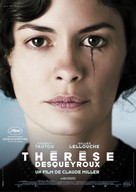Reviews provided by RottenTomatoes
Manohla Dargis, New York Times: Mr. Miller's stolid approach - with its waxwork figures, postcard beauty, insistent tastefulness and glaze of politesse - feels far too comfortably of this world to mount a critique of it. Read more
Boyd van Hoeij, Variety: Claude Miller's final film is tastefully upholstered, but the narrative generates little heat, empathy or momentum. Read more
Nick Schager, AV Club: [A] static, emotionless saga, which is defined less by zealous feeling than by a dull, decorous air of respectability. Read more
Peter Keough, Boston Globe: The film looks great. As for the human element, the mood is more apathetic than tragic, and star Audrey Tautou has to take much of the blame for the film's failure. Read more
Stephen Dalton, Hollywood Reporter: A classic story competently told, Therese Desqueyroux is chocolate-box heritage cinema at heart, but a perfectly respectable and emphatically French epitaph to Miller's long career. Read more
Sheri Linden, Los Angeles Times: Miller's film is a work of emotional reserve, eschewing psychological explanation in favor of unadorned observation - of human behavior as well as nature and the still lifes of the domestic world. Read more
Jordan Hoffman, New York Daily News: While not a nail-biter, the flowery dialogue (many elegant letters are read in voice-over), juicy twists and moral ambiguity make this a period piece worth slowing down for. Read more
Tirdad Derakhshani, Philadelphia Inquirer: A remarkably pretty, if equally dour, portrait of the bored, oppressive life led by the provincial bourgeoisie. Read more
Walter V. Addiego, San Francisco Chronicle: While there's a certain staid feeling to the production, it does deliver a solid working-over to the era's gentry. Read more
Colin Covert, Minneapolis Star Tribune: Exquisitely tasteful but suffocatingly dull ... Read more
Michael Atkinson, Time Out: The movie may look pretty and may plod, but it also leaves a bruise. Read more
Aaron Hillis, Village Voice: If the banality of life within the Bordeaux gentry is the point, then the ensuing oppressiveness is immaculately depicted through precise performances and camerawork-just don't call it emotionally engaging drama. Read more
Stephanie Merry, Washington Post: The magnificent nature that surrounds Therese becomes her prison. It's an interesting paradox, but not necessarily an especially satisfying experience. Read more

